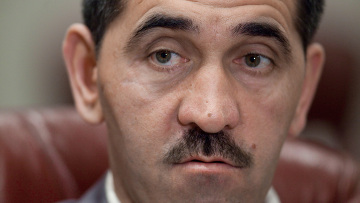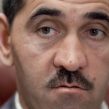
Ingushetia’s Growing Instability Sign of Yevkurov’s Waning Political Clout
Publication: Eurasia Daily Monitor Volume: 9 Issue: 129
By:

In June 2012, Ingushetia was the third deadliest republic in the North Caucasus, behind only Dagestan and Kabardino-Balkaria. Six people died in attacks in the republic and 17 were injured, while 11 were killed and 12 wounded in Kabardino-Balkaria, and 28 were killed and ten wounded in Dagestan. Given Ingushetia’s small size – it is nearly half as populous as Kabardino-Balkaria and about six times less populous than Dagestan – the conflict in Ingushetia appears to be heating up (www.kavkaz-uzel.ru, July 6).
Russian journalist Georgy Aleksandrov, who recently visited Ingushetia, paints a grim picture of the republic. “Upon landing, it seems that the airplane is touching down not in a peaceful town, but in a military base,” he wrote, noting that one sees an array of “heavy military equipment, cannons and howitzers. On the way [from the airport] to Nazran, one passes by checkpoints with different-sized barrels sticking out of the gun-slots.” According to Aleksandrov, locals say that power in Ingushetia shifts along with the sun’s movement, with the law enforcement agencies ruling during the day time and the militants in charge at night (https://www.aif.ru/politics/article/53231).
The first term of Ingushetia’s president, Yunus-Bek Yevkurov, expires in the fall of 2012. According to Russian legislation that was signed into law in June, regional heads and governors will be popularly elected, so Yevkurov is going to face an electoral challenge later this year or in 2013. In an interview with Ekho Moskvy radio in May, Yevkurov said that he was not sure he would be popularly elected as Ingushetia’s head. He also doubted voters were “ready” for the return of popular elections of governors in Russia, which were replaced with an appointment system back in 2004 (https://www.ingnews.ru/index.php?option=com_content&view=article&id=8916:-q-q&catid=5:2009-01-28-06-44-03&Itemid=7).
In 2008, then President Dmitry Medvedev appointed General Yevkurov president of Ingushetia. Given Yevkurov’s background in Russian military intelligence, his absence of previous political experience and the way he came to power, Yevkurov may easily lose the elections in an open contest. Yevkurov’s popularity appears to have reached the lowest point since his appointment. The independent magazine Dosh and the Center for Caucasian Initiative polled over 800 of Ingushetia’s residents in April-May and found that 93 percent of the respondents did not trust Yevkurov. Part of the reason for the public’s distrust of Yevkurov is the continuing instability in the republic, which includes human rights violations by the law enforcement agencies and other government authorities (https://www.kavkaz-uzel.ru/articles/208648/).
On June 29, servicemen from the Federal Security Service (FSB) and Interior Ministry launched a special operation in Ingushetia’s main city, Nazran. Akhmedkhan Aushev, Zurab Didigov and Magomed-Bashir Mislourov were arrested and charged with illegal arms possession and participation in illegal armed groups. Relatives of those arrested lodged complaints with the Memorial human rights group’s branch in Ingushetia, since they could not locate the men after their arrest. In addition, police reportedly did not conduct the searches in the presence of witnesses, as required by law. Akhmedkhan Aushev’s brother Rustam was kidnapped in February 2012 in the city of Mineralnye Vody in Stavropol region (https://ingushetiyaru.org/news/23078.html). According to Aushev’s relatives, prior to the arrest, the law enforcement agents had unofficially demanded that he drop his efforts to find his brother Rustam, threatening him with abduction (https://www.habar.org/?p=13643).
On July 2, Khamzat Yevloev alleged that Yevkurov had issued a verbal order to Ingushetia’s law enforcement agencies to start persecuting the most orthodox Muslims, including females who wear the hijab – traditional Muslim dress. Yevkurov reportedly said that reprisals might be applied not only to the suspected rebels, but also to their family members and sympathizers (https://ingushetiyaru.org/news/23071.html). With a broad definition like that, a majority of Ingushetia’s population could be defined as “rebels” and thus targeted. Although Yevloev’s allegations are unconfirmed and may not be true, they indicate a high level of distrust for the republican leadership and a conflict inside Ingushetia’s government circles.
Public trust in Ingushetia has been shaken not only with regard to government officials, but also government institutions themselves. In May, several residents of Ingushetia received harsh sentences for the derailment of the Nevsky Ekspress train near Moscow in 2009. Four persons received life sentences and several others lengthy prison terms. All the suspects came from two Ingush clans, the Kartoevs and the Yevloevs (https://www.bbc.co.uk/russian/russia/2012/05/120522_nevsky_express_conviction.shtml). Sentencing terrorism suspects to prison terms in Russia is a relatively unusual practice. Normally, suspects are killed by the security services on the spot. Relatives of the sentenced individuals disagreed with the court ruling, saying that it was “unlawful,” and announced they would hold a public protest in Ingushetia on July 20 (https://ingushetiyaru.org/news/23084.html).
It appears that rulings by government institutions in general are seen as unlawful and unjust in Ingushetia. This is not surprising given that the law enforcement agencies there have incessantly shown disregard for the republic’s laws. Some reports suggest that bloggers are now also receiving indirect threats from the government. On July 5, a blogger by the last name of Yevloev stated that pro-government elders had approached his relatives and asked them to urge him to stop writing online. Asked what would happen if he did not stop blogging, one of the elders reportedly said: “I do not know. There are many people disappearing. [If something happens] then do not go to Yevkurov with pleas to return your brother” (https://ingushetiyaru.org/news/23081.html).
Despite the government’s brutal practices and even significant successes in cracking down on the insurgents in Ingushetia, it has not resolved key issues in the republic and thus is no closer to a lasting peace in the republic than it was several years ago. Ingushetia serves as a stark example to Russian politicians that even with additional financial assistance, increased force cannot resolve the primary security issues of a region without participatory politics and rule of law.




